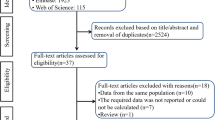Abstract
The objective was to study available evidence for ingredients of popular over-the-counter testosterone and erectile dysfunction (ED) supplements. The top 16 male testosterone and 16 ED supplements in the USA were identified from the most popular online retailers: A1 Supplements, Amazon, Vitamin Shoppe, and Walmart. In total, 37 ingredients were identified and PUBMED online database was reviewed for randomized-controlled trials (RCT) studying their efficacy. Ingredients were categorized based on evidence quantity using an adapted version of the American Heart Association scoring system. In total, 16 ingredients from testosterone supplements and 21 from ED supplements were identified. Tribulus, Eurycoma longifolia, Zinc, L-arginine, Aspartate, Horny goat weed, and Yohimbine were most common. In all, 105 RCTs studying the identified ingredients were found. No whole supplement products have published RCT evidence. 19% of ingredients received an A grade for strong positive evidence with net positive evidence in two or more RCTs. In total, 68% received C or D grades for contradicting, negative, or lacking evidence. Overall, 69% of ingredients in testosterone supplements and 52% of ingredients in ED supplements have published RCT evidence. Many male supplements claim to improve testosterone or ED parameters; however, there is limited evidence, which should be considered when counseling patients.
This is a preview of subscription content, access via your institution
Access options
Subscribe to this journal
Receive 8 print issues and online access
$259.00 per year
only $32.38 per issue
Buy this article
- Purchase on Springer Link
- Instant access to full article PDF
Prices may be subject to local taxes which are calculated during checkout


Similar content being viewed by others
References
Kantor ED, Rehm CD, Du M, White E, Giovannucci EL. Trends in dietary supplement use among US adults from 1999-2012. JAMA. 2016;316:1464–74.
Baillargeon J, Urban RJ, Ottenbacher KJ, Pierson KS, Goodwin JS. Trends in androgen prescribing in the United States, 2001 to 2011. JAMA Intern Med. 2013;173:1465–6.
Chaitoff A, Killeen TC, Nielsen C. Men’s health 2018: BPH, prostate cancer, erectile dysfunction, supplements. Clevel Clin J Med. 2018;85:871–80.
Dwyer JT, Coates PM, Smith MJ. Dietary dupplements: regulatory challenges and research resources. Nutrients. 2018;10:41.
Cui T, Kovell RC, Brooks DC, Terlecki RP. A urologist’s guide to ingredients found in top-selling nutraceuticals for men’s sexual health. J Sex Med. 2015;12:2105–17.
Balasubramanian A, Thirumavalavan N, Srivatsav A, Yu J, Lipshultz LI, Pastuszak AW. Testosterone imposters: an analysis of popular online testosterone boosting supplements. J Sex Med. 2019;16:203–12.
Rivas AM, Mulkey Z, Lado-Abeal J, Yarbrough S. Diagnosing and managing low serum testosterone. Proc (Bayl Univ Med Cent). 2014;27:321–4.
Bhasin S, Cunningham GR, Hayes FJ, Matsumoto AM, Snyder PJ, Swerdloff RS, et al. Testosterone therapy in men with androgen deficiency syndromes: an Endocrine Society clinical practice guideline. J Clin Endocrinol Metab. 2010;95:2536–59.
Rew KT, Heidelbaugh JJ. Erectile dysfunction. Am Fam Physician. 2016;94:820–7.
Pastuszak AW. Current diagnosis and management of erectile dysfunction. Curr Sex Health Rep. 2014;6:164–76.
Ko EY, Sabanegh ES. The role of over-the-counter supplements for the treatment of male infertility-fact or fiction? J Androl. 2012;33:292–308.
Moher D, Liberati A, Tetzlaff J, Altman DG, Group P. Preferred reporting items for systematic reviews and meta-analyses: the PRISMA statement. PLoS Med. 2009;6:e1000097.
Budoff MJ, Achenbach S, Blumenthal RS, Carr JJ, Goldin JG, Greenland P, et al. Assessment of coronary artery disease by cardiac computed tomography: a scientific statement from the American Heart Association Committee on Cardiovascular Imaging and Intervention, Council on Cardiovascular Radiology and Intervention, and Committee on Cardiac Imaging, Council on Clinical Cardiology. Circulation. 2006;114:1761–91.
Balasubramanian A, Thirumavalavan N, Srivatsav A, Yu J, Hotaling JM, Lipshultz LI, et al. An analysis of popular online erectile dysfunction supplements. J Sex Med. 2019;16:843–52.
LaValley SA, Kiviniemi MT, Gage-Bouchard EA. Where people look for online health information. Health Inf Libr J. 2017;34:146–55.
Bailey RL, Gahche JJ, Miller PE, Thomas PR, Dwyer JT. Why US adults use dietary supplements. JAMA Intern Med. 2013;173:355–61.
Bailey RL. Current regulatory guidelines and resources to support research of dietary supplements in the United States. Crit Rev Food Sci Nutr. 2020;60:298–309.
Guallar E, Stranges S, Mulrow C, Appel LJ, Miller ER 3rd. Enough is enough: stop wasting money on vitamin and mineral supplements. Ann Intern Med. 2013;159:850–1.
Supplements: a scorecard. Harvard Men's Health Watch. 2012;16:1–5.
Author information
Authors and Affiliations
Corresponding author
Ethics declarations
Conflict of interest
The authors declare that they have no conflict of interest.
Additional information
Publisher’s note Springer Nature remains neutral with regard to jurisdictional claims in published maps and institutional affiliations.
Supplementary information
Rights and permissions
About this article
Cite this article
Kuchakulla, M., Narasimman, M., Soni, Y. et al. A systematic review and evidence-based analysis of ingredients in popular male testosterone and erectile dysfunction supplements. Int J Impot Res 33, 311–317 (2021). https://doi.org/10.1038/s41443-020-0285-x
Received:
Revised:
Accepted:
Published:
Issue Date:
DOI: https://doi.org/10.1038/s41443-020-0285-x
This article is cited by
-
Is Reddit a reliable source for information on erectile dysfunction treatment?
International Journal of Impotence Research (2023)


